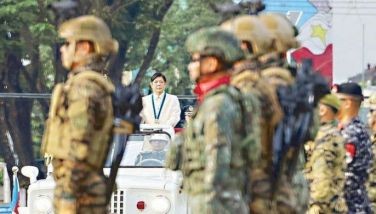247 rogue cops get axed
January 9, 2006 | 12:00am
A total of 247 policemen were dismissed from the service last year while 617 others have been suspended, Interior and Local Government Secretary Angelo Reyes reported yesterday.
Reyes, who is also chairman of the National Police Commission (Napolcom), reported that 49 police officers were demoted while nine others were forced to resign due to various offenses.
Reyes said 785 policemen were meted disciplinary actions under the anti-TABA (tamad, abusado, bastos, ayaw padisiplina) program aimed to instill discipline in the police ranks.
The anti-TABA campaign was the brainchild of retired Philippine National Police (PNP) chief director general Edgar Aglipay, who personally ordered hundreds of policemen to undergo "reorientation and reformatory" training at the former US naval base in Subic Bay, Zambales.
A total of 92 so-called "kotong cops," or police officers caught mulcting motorists, were apprehended and meted administrative and criminal sanctions by the DILG through Napolcom.
Reyes said the program yielded positive response from the public in PNP’s effort to cleanse the police force of "bad eggs."
Reyes vowed to initiate more programs to professionalize the PNP and rid its ranks of scalawags and misfits this year.
"There are only a few bad eggs in the PNP and most policemen are dedicated to their duties to protect the public, keep the peace, and enforce the law," Reyes pointed out.
He assured though the members of the national police force that they will not be affected by the campaign as long as they perform their duties and mandate.
Reyes hopes that the sustained DILG and Napolcom campaign to cleanse the ranks of the PNP through the trilateral partnership with local chief executives and the community, would soon transform the police force into one that "is respected by the people but is no pushover."
"We want a police force that is feared by the criminals. That is our overall objective," Reyes said.
On the other hand, PNP chief Director General Arturo Lomibao has approved promotions of a number of policemen who had showed exemplary courage in the performance of their duties.
Lomibao hoped that the promotion of a few good men would further inspire other policemen to do good for the community, and thus help in regaining the respect of the community.
The PNP has spent P5,000 a month for retraining each of the misfit policemen who were sent to the Subic retraining camp.
Aglipay launched the program in his effort to reform and restore credibility on the police force.
Aglipay has stressed no one is exempted from retraining, including him.
Among the ranking officers sent for retraining was Chief Superintendent Danilo Mangila, the former commander of the PNP Traffic Management Group at Camp Crame in Quezon City.
The program, however, drew adverse reactions from various police groups and warned the move could demoralize the rank-and-file and trigger protests among policemen.
The "TABA" policemen undergo daily exercises, lectures on basic leadership and formation drills where each one is asked to lead regardless of his rank. Evening prayers are also part of their daily routine.
The trainees have been ordered to surrender their service firearms, watches, jewelry and cellular phones so they will not get distracted during the retraining.
They were each given athletic brown and fatigue uniforms, bedsheets and pillows, mosquito nets, blankets and combat boots.
A day of the TABA cops starts with a reveille at 4 a.m. After the athletics, the taba cops freshen themselves up, change into type A uniforms, and report to the mess hall for breakfast.
The lectures start at 8 a.m. and last up to 4 p.m., followed by another round of jogging, then dinner and more lectures. The policemen’s day ends at 10 p.m., after 15 minutes of prayers and reading of Bible verses. - With Jaime Laude
Reyes, who is also chairman of the National Police Commission (Napolcom), reported that 49 police officers were demoted while nine others were forced to resign due to various offenses.
Reyes said 785 policemen were meted disciplinary actions under the anti-TABA (tamad, abusado, bastos, ayaw padisiplina) program aimed to instill discipline in the police ranks.
The anti-TABA campaign was the brainchild of retired Philippine National Police (PNP) chief director general Edgar Aglipay, who personally ordered hundreds of policemen to undergo "reorientation and reformatory" training at the former US naval base in Subic Bay, Zambales.
A total of 92 so-called "kotong cops," or police officers caught mulcting motorists, were apprehended and meted administrative and criminal sanctions by the DILG through Napolcom.
Reyes said the program yielded positive response from the public in PNP’s effort to cleanse the police force of "bad eggs."
Reyes vowed to initiate more programs to professionalize the PNP and rid its ranks of scalawags and misfits this year.
"There are only a few bad eggs in the PNP and most policemen are dedicated to their duties to protect the public, keep the peace, and enforce the law," Reyes pointed out.
He assured though the members of the national police force that they will not be affected by the campaign as long as they perform their duties and mandate.
Reyes hopes that the sustained DILG and Napolcom campaign to cleanse the ranks of the PNP through the trilateral partnership with local chief executives and the community, would soon transform the police force into one that "is respected by the people but is no pushover."
"We want a police force that is feared by the criminals. That is our overall objective," Reyes said.
On the other hand, PNP chief Director General Arturo Lomibao has approved promotions of a number of policemen who had showed exemplary courage in the performance of their duties.
Lomibao hoped that the promotion of a few good men would further inspire other policemen to do good for the community, and thus help in regaining the respect of the community.
The PNP has spent P5,000 a month for retraining each of the misfit policemen who were sent to the Subic retraining camp.
Aglipay launched the program in his effort to reform and restore credibility on the police force.
Aglipay has stressed no one is exempted from retraining, including him.
Among the ranking officers sent for retraining was Chief Superintendent Danilo Mangila, the former commander of the PNP Traffic Management Group at Camp Crame in Quezon City.
The program, however, drew adverse reactions from various police groups and warned the move could demoralize the rank-and-file and trigger protests among policemen.
The "TABA" policemen undergo daily exercises, lectures on basic leadership and formation drills where each one is asked to lead regardless of his rank. Evening prayers are also part of their daily routine.
The trainees have been ordered to surrender their service firearms, watches, jewelry and cellular phones so they will not get distracted during the retraining.
They were each given athletic brown and fatigue uniforms, bedsheets and pillows, mosquito nets, blankets and combat boots.
A day of the TABA cops starts with a reveille at 4 a.m. After the athletics, the taba cops freshen themselves up, change into type A uniforms, and report to the mess hall for breakfast.
The lectures start at 8 a.m. and last up to 4 p.m., followed by another round of jogging, then dinner and more lectures. The policemen’s day ends at 10 p.m., after 15 minutes of prayers and reading of Bible verses. - With Jaime Laude
BrandSpace Articles
<
>
- Latest
- Trending
Trending
Latest
Trending
Latest
Recommended






























